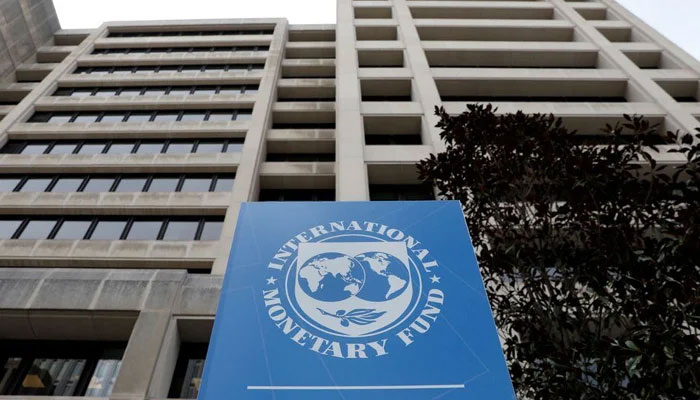Pakistan needs to repay external debt of $18.8bn in current fiscal: IMF
Lender estimates that Islamabad’s external financing needs have ballooned to $62.6 billion in three years under EFF programme
ISLAMABAD: Terming Pakistan’s external debt repayment capacity as fragile, IMF has assessed Islamabad’s external financing needs have ballooned to $62.6 billion over three years period under the Extended Fund Facility (EFF) programme.
The external financing needs will go up to $110.5 billion if calculated for five years from 2024-25 to 2028-29.
According to the IMF staff report, Pakistan will have external financing needs of $18.813 billion in the current fiscal year, $20.088 billion in 2025-26 and $23.714 billion in 2026-27.
The IMF data shows financing needs would not witness any reduction even after completion of three-year programme. It would be standing at $24.625 billion in 2027-28 and $23.235 billion in fiscal year 2028-29.
“Pakistan’s capacity to repay is subject to significant risks and remains critically dependent on policy implementation and timely external financing,” the IMF warned. The Fund’s exposure would reach Special Drawing Rights (SDR) 6,816 million by September 2024 (336pc of quota) with purchases linked to the request.
With the completion of all purchases under the arrangement, the Fund’s exposure would peak in September 2027 at SDR 8,774 million (432pc of quota; approximately 55pc of projected gross reserves for FY27) around double the average for recent EFFs.
“Exceptionally high risks — notably from high public debt and gross financing needs, low gross reserves and sociopolitical factors — could jeopardise policy implementation and erode repayment capacity and debt sustainability,” it further said.
Restoring fiscal and external viability is critical to ensure Pakistan’s capacity to repay the Fund. This hinges on strong and sustained policy implementation, including, but not limited to fiscal consolidation and external asset accumulation, as well as decisive reforms to enable stronger and more resilient economic development.
On external financing, IMF says multilateral disbursements are projected to reach $14 billion over FY25-28 (including $7.1 billion from World Bank and $5.6 billion from Asian Development Bank) with key bilateral creditors fully maintaining their exposure through new financing activities. Modest access to new short-term borrowing from commercial banks is anticipated for FY25-FY26, with a gradual return to bond markets assumed for mid-FY27, reflecting a restoration of policy credibility.
The IMF sponsored programme is fully financed, with firm commitments for the first 12 months and good prospects thereafter. Financing committed for FY25 includes $16.8 billion of rollovers of existing short-term financing and $2.5 billion of additional commitments, including from China, Saudi Arabia, ADB and IsDB.
The Pak authorities have received firm commitments from key bilateral partners to (at least) maintain their existing exposures throughout the programme, including rolling over existing short-term liabilities, which will contribute to meeting financing needs in the remaining period.
Loans from foreign commercial banks totaling $6.6 billion, which were renewed during the 2019 EFF and 2023 SBA, are also expected to continue to be rolled during the new programme. These together with commitments from multilateral institutions provide necessary financing assurances.
Nonetheless, financing risks remain high and continued monitoring will be needed to ensure timely and adequate financing during programme reviews.
According to brokerage Topline Securities chief Mohammad Sohail, Pakistan gross financing requirement for FY25 is $18.8bn, which is a nine-year low according to IMF data. Average gross financing requirement over last nine years has remained $25bn. This is contrary to common perception that Pakistan has to pay a record high amount in next few years.
“Significant fall in gross financing requirement for FY25 is on the back of contained current account deficit of $3.6bn and relatively lower repayments in FY25 to the tune of $15.2bn. Similarly, over next 3 years (FY25-28), IMF has lowered gross requirement of Pakistan by cumulative US$4.2bn and over next 2 years by US$5.2bn due to anticipated fall in current account deficit.”
-
 Jessie Buckley Reveals Why BAFTA Win Felt Extra 'special' With Cillian Murphy
Jessie Buckley Reveals Why BAFTA Win Felt Extra 'special' With Cillian Murphy -
 Halle Berry Reveals Bedroom Performances That Are Off-limits In Her Engagement To Van Hunt
Halle Berry Reveals Bedroom Performances That Are Off-limits In Her Engagement To Van Hunt -
 Why Nicole Kidman 'not Rushing' Into Love After Split From Keith Urban?
Why Nicole Kidman 'not Rushing' Into Love After Split From Keith Urban? -
 Benny Blanco's Dirty Feet In Debut Podcast Divide The Internet
Benny Blanco's Dirty Feet In Debut Podcast Divide The Internet -
 Jeffrey Epstein Blamed King Charles As Andrew Left Trade Enjoy Job
Jeffrey Epstein Blamed King Charles As Andrew Left Trade Enjoy Job -
 King Charles Asked To Lean On Princess Anne To Avoid ‘media Circus’
King Charles Asked To Lean On Princess Anne To Avoid ‘media Circus’ -
 Passenger Wins £10,000 Payout From Heathrow Airport After 100 Ml Liquids Dispute
Passenger Wins £10,000 Payout From Heathrow Airport After 100 Ml Liquids Dispute -
 Eric Dane's Costar Under Fire For Hurling Accusations At Him After His Death
Eric Dane's Costar Under Fire For Hurling Accusations At Him After His Death -
 Paul Anthony Kelly Breaks Silence Over Online Discussion About His Chest Hair: 'I Own It'
Paul Anthony Kelly Breaks Silence Over Online Discussion About His Chest Hair: 'I Own It' -
 Queen Camilla Greets The Paddington Bear At BBC’s 500 Words Grand Final
Queen Camilla Greets The Paddington Bear At BBC’s 500 Words Grand Final -
 Chinese Astronauts Finally Reveal Why Spacecraft Left Them ‘stranded’ For 437 Days In Space
Chinese Astronauts Finally Reveal Why Spacecraft Left Them ‘stranded’ For 437 Days In Space -
 Khloe Kardashian Reacts To AI Videos With Dad Robert Kardashian Kissing Her: 'That Freaks Me Out'
Khloe Kardashian Reacts To AI Videos With Dad Robert Kardashian Kissing Her: 'That Freaks Me Out' -
 Sinitta Makes Shock Admission About Marriage To Andy Willner Post Simon Cowell Heartbreak
Sinitta Makes Shock Admission About Marriage To Andy Willner Post Simon Cowell Heartbreak -
 Bill Gates Calls Ties To Jeffrey Epstein 'huge Mistake,' Reveals Past 'affairs'
Bill Gates Calls Ties To Jeffrey Epstein 'huge Mistake,' Reveals Past 'affairs' -
 Switzerland Announces One-time Compensation For Swiss Bar Fire Victims
Switzerland Announces One-time Compensation For Swiss Bar Fire Victims -
 Ryan Coogler Shares Thoughts About Building Community Of Actors Amid 'Sinners' Success
Ryan Coogler Shares Thoughts About Building Community Of Actors Amid 'Sinners' Success




